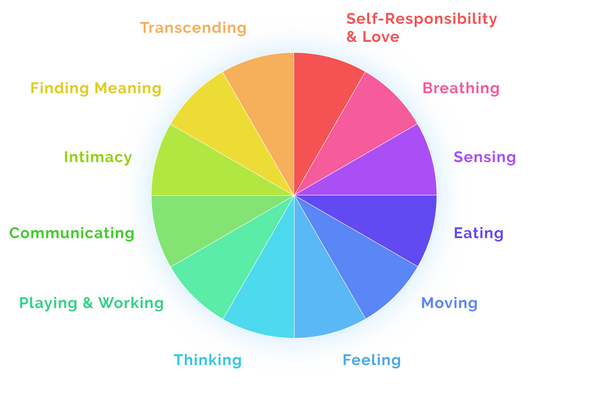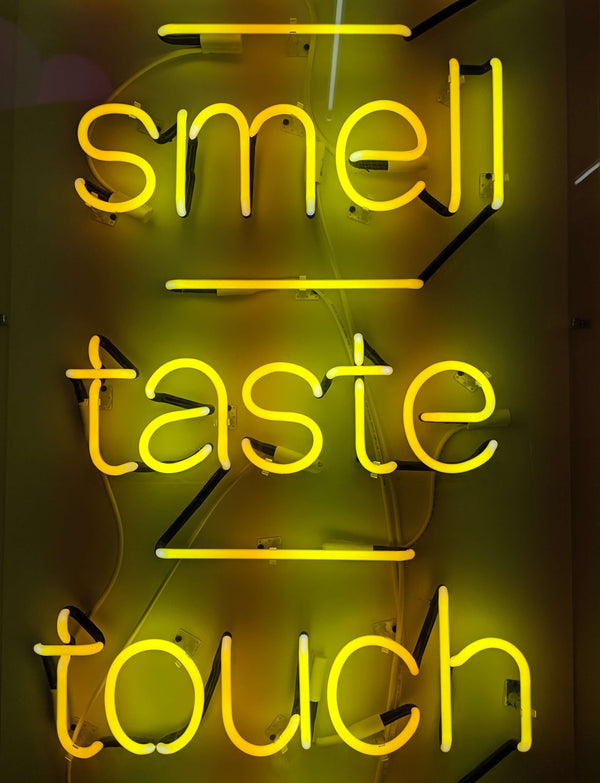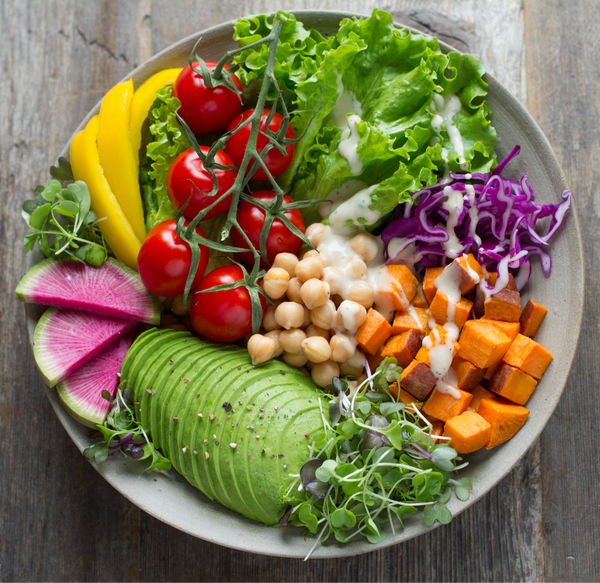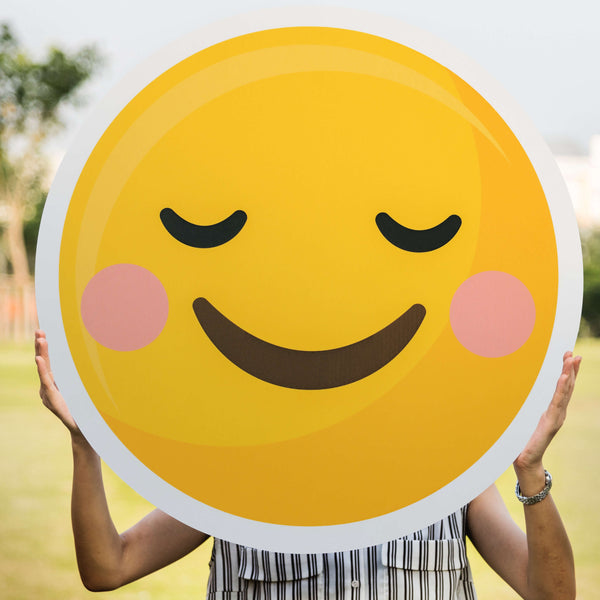)
Twelve dimensions form the basis of the Wellness Inventory, the original wellness assessment, developed by wellness pioneer John W. Travis, MD, MPH.
This dynamic whole person model, formally referred to as the Wellness Energy System, is comprised of the 12 fundamental life processes that interact with one another to shape our life experience and our state of personal wellbeing.
)
Self-Responsibility & Love form two primary foundations for your personal wellness. Often, we put ourselves last, taking care of our loved ones and professional obligations first. If we are not experiencing self-love, and have a negative self-image or negative feelings about ourselves, we may feel a lack of motivation to practice self-care.
Here you will learn to discover your real needs and how to meet them directly. You will learn about the power of self-compassion, and how it can reduce relentless negative self-talk and strengthen your desire to improve your personal wellness.
)
Breathing is our most essential life process – it’s our primary way to bring energy in our system; breathing provides the oxygen essential for producing energy in the mitochondria of our cells. However, we tend to be unaware of our breathing process and the benefits of mindful breathing.
In this section, you will become more aware of your breathing and practice breathing more slowly and mindfully. Mindful breathing is like a reset button, helping to promote relaxation, calming your emotions, focusing your mind, and heightening your sensory awareness, allowing you to be more present.
)
We use our senses - seeing, touching, smelling, hearing, tasting – to navigate and experience our world. However, our senses can be dulled from many lifestyle factors including overwork, excessive screen time, sensory overload, and lack of sleep.
As you work with the Sensing dimension you will discover how your life can be enriched by mindfully engaging your senses in some of your favorite everyday activities such as taking a morning walk, eating a meal, listening to your favorite music, or taking a shower or bath. Bringing a focus to your sensory experience allows you to be more PRESENT and make better choices, perform at a higher level, and more fully engage in your relationships.
)
Like breathing, eating is one of our primary sources of metabolic energy to drive our lives. However, with today’s diet of processed foods the quality of our diet doesn’t produce the consistent energy we need to power our lives and can also lead to many health problems.
As you focus on the Eating dimension, you will begin to appreciate the true value of eating a predominantly plant-based diet composed of fresh, whole foods when possible, eaten in moderation, to provide the energy to live our optimal life. This is true self-care – eating for physical, mental, and emotional health and wellbeing. You will also discover the importance of mindful eating which incorporates a deeper awareness of your senses and your breathing as you eat to help you slow down, more fully enjoy the eating experience, improve digestion, and eat less.
)
Moving is a basic expression of our life energy. Maintaining a dynamic balance of movement and rest is essential to our health and wellbeing. In our fast-paced lives we often find that we have become too sedentary and struggle to find the time and strategies to reintroduce more movement or physical activity into our lives. This can lead to increasing levels of guilt and frustration.
What are your favorite forms of moving your body? Do you like to take walks, lift weights, do yoga, dance, do Cross-fit or garden? As you explore this dimension you will understand how important maintaining lifelong physical activity is to you as a whole person – in body, mind and spirit – and how you can you can use a small steps approach to develop strategies to incorporate more of the physical activity you love into even the busiest life.
)
Feelings are your emotions. Feelings are not the same as thoughts, although the two are deeply intertwined. For any given event, you respond by both feeling and thinking. Yet, most of us give priority to our thoughts about a subject and often ignore our feelings. It is no wonder that so many of us do not feel in touch with our feelings.
This dimension focuses on becoming more aware of the marvelous gift of feelings. We will focus on increasing our level of emotional intelligence, the ability the identify and manage our own emotions and to recognize the emotions of others. We will learn how to use our breath to become calmer and more centered when we are experiencing anger or anxiety.
)
Our mind can be our greatest friend or our greatest enemy. At times we may find ourselves falling into a cycle of negative thinking that seriously impacts our personal wellbeing. Other times we can’t seem turn our minds off and when we lay down to sleep at night! How can we live in such a way that our thinking truly serves us?
This Dimension focuses on the power of thinking, how it relates to physical and mental health, and offers creative options for using thinking to improve your wellbeing. Here we learn how being mindful of our thinking enables us to make positive choices for personal wellbeing. New research has shown that the brain has the capacity to continuously change throughout your life.
)
We spend the majority of our time focused on work and daily tasks with too little time allowed for play. What passes for play for most adults is more likely to be escape activities instead of engaging in the joyful, creative, spontaneous play that is vital to your wellbeing.
Balancing work and play enables us to recharge and supports personal health and wellbeing. In this module you learn to recapture the spirit of play that can restore balance to your life. What are your favorite ways to play?
)
Communicating allows us to share our internal reality of thoughts and feelings with others, and to convey our wants and needs. However, we often experience challenges in our communication due to our judgements and assumptions and fully hearing what the other person is saying.
In this dimension we learn to improve our listening skills and to better understand the breakdowns in communication that can occur. We also learn to create more positive internal dialogues as what we constantly tell ourselves plays a big role in influencing our personal wellbeing.
)
There are many kinds of intimacy, ranging from a close friendship or family tie to a long-term relationship or marriage. Whatever the relationship, intimacy is an essential component to our health and wellbeing.
In this dimension we learn that sex is only one of 12 types of intimacy that you can share in relationships whether it is with a romantic partner, friend, or loved one. This expands our possibilities for deepening intimacy in our lives. We learn that the foundation of intimacy is trust, which allows for authentic connection. Learning to respond to each other with appreciation, respect, and friendship is the key to building intimacy in a relationship.
)
A key defining element of being human is our search for a deeper meaning in life. The search for meaning involves basic questions: Who am I? Why am I here?
Contemplating (and living with) these questions can bring deeper meaning into the actions and activities of our everyday life, which is all too often on autopilot. By learning and experiencing more deeply who we are and what is meaningful and important in our lives, we are able to live more fully as human beings.
)
Transcending has many faces including the experience of being in a state of flow. It is the moment of overcoming, of crossing the invisible barrier from being on autopilot to being awake, from saying “no” to life to saying “yes”. Transcending is the dimension of spirituality, faith, and of experiencing our connection to something greater than ourselves.
As you focus on Transcending after your journey through the first 11 dimensions, you will discover that this is where we experience the synergy of all of the dimensions working in harmony and with more of their full potential. This is where we experience a state of flow and peak performance, an experience of being fully awake and engaged in the present moment.